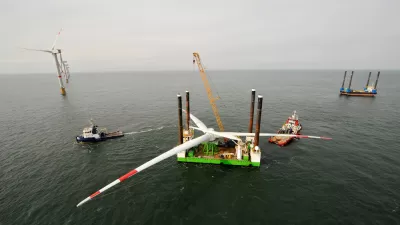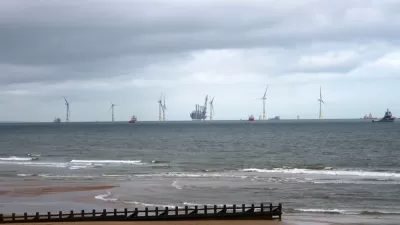Hopes for New Jersey to be a national leader in offshore wind energy were dealt a setback when the state Board of Public Utilities rejected the financial plan of a 25-megawatt project proposed for a site three miles off the coast near Atlantic City.
James M. O’Neill reports on the latest setback for a project that would build a 25-megawatt wind farm three miles offshore from Atlantic City. New Jersey’s Board of Public Works unanimously rejected the financial plan for the project by Fishermen’s Energy, a Cape May-based group of commercial fishermen. The project’s financial plan “was based on an expectation of receiving about $100 million in federal grants and tax breaks. The group projected it could complete the project and recoup the cost of financing if it also received financial credits – called Offshore Wind Renewable Energy Certificates, or ORECs — from the state worth $199 for each megawatt hour of energy it produced.”
The board, however, “argued that without that $100 million, the project would need to receive ORECs from the state of $263 per megawatt hour to be viable.” At that price, “[the] project would therefore fail one of the basic tests for approval – providing net benefits to ratepayers.”
FULL STORY: N.J. rejects financial plan for offshore wind turbines

Study: Maui’s Plan to Convert Vacation Rentals to Long-Term Housing Could Cause Nearly $1 Billion Economic Loss
The plan would reduce visitor accommodation by 25,% resulting in 1,900 jobs lost.

North Texas Transit Leaders Tout Benefits of TOD for Growing Region
At a summit focused on transit-oriented development, policymakers discussed how North Texas’ expanded light rail system can serve as a tool for economic growth.

Why Should We Subsidize Public Transportation?
Many public transit agencies face financial stress due to rising costs, declining fare revenue, and declining subsidies. Transit advocates must provide a strong business case for increasing public transit funding.

How to Make US Trains Faster
Changes to boarding platforms and a switch to electric trains could improve U.S. passenger rail service without the added cost of high-speed rail.

Columbia’s Revitalized ‘Loop’ Is a Hub for Local Entrepreneurs
A focus on small businesses is helping a commercial corridor in Columbia, Missouri thrive.

Invasive Insect Threatens Minnesota’s Ash Forests
The Emerald Ash Borer is a rapidly spreading invasive pest threatening Minnesota’s ash trees, and homeowners are encouraged to plant diverse replacement species, avoid moving ash firewood, and monitor for signs of infestation.
Urban Design for Planners 1: Software Tools
This six-course series explores essential urban design concepts using open source software and equips planners with the tools they need to participate fully in the urban design process.
Planning for Universal Design
Learn the tools for implementing Universal Design in planning regulations.
City of Santa Clarita
Ascent Environmental
Institute for Housing and Urban Development Studies (IHS)
City of Grandview
Harvard GSD Executive Education
Toledo-Lucas County Plan Commissions
Salt Lake City
NYU Wagner Graduate School of Public Service





























